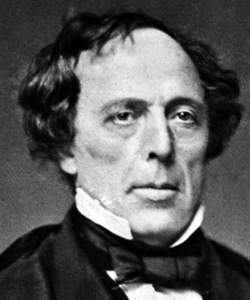John Buchanan Floyd, Governor (American National Biography)
Scholarship
In December 1848 Floyd was elected governor by a coalition of Democrats and Whigs, who supported his views on constitutional reform and internal improvements. As governor he advocated white manhood suffrage, a more equitable apportionment of the legislature on the basis of the white population, and an elective judiciary. He also pushed for an extensive program of turnpike, canal, and railroad construction. His administration stabilized the commonwealth's credit through a program of bond sales and oversaw an unprecedented expansion of appropriations for internal improvements. Floyd continued to defend southern rights while governor. He sought to strengthen slavery by aiding the Virginia Colonization Society in the removal of the commonwealth's free black population. He attacked the "never ending aggression" of the northern abolitionists and proposed that the commonwealth tax the incoming goods from those free states that persisted in refusing to return fugitive slaves. Finally, Governor Floyd issued a call for a national convention to oppose "agitation of the slavery question" and aided the formation in Richmond of the Central Southern Rights Association. He warned that, if the South did not resist, the northern fanatics would eventually control Congress and eliminate slavery.
William G. Shade, "Floyd, John Buchanan,” American National Biography Online, February 2000, http://www.anb.org/articles/04/04-00382.html.
John Buchanan Floyd, Secretary of War (American National Biography)
Scholarship
[President James] Buchanan, seeking a Virginian for his cabinet, brought Floyd in as secretary of war when [Henry Alexander] Wise turned down the offer of a position as secretary of state. There Floyd acted with the "directory" of prosouthern advisers, repudiating Robert J. Walker's handling of the situation in Kansas and favoring the acceptance of the proslavery Lecompton constitution. Unfortunately, he became infamous for his slipshod administration of the War Department. Not only did Floyd favor his friends and relatives in awarding government contracts, but he also became increasingly involved in issuing "acceptances" that allowed contractors to borrow money against their promissory notes signed by the secretary of war…Throughout his political career, Floyd had been a states' rights Democrat and an outspoken defender of slavery and southern rights. On 3 December 1860 he asserted that he was "not for secession as long as any honorable effort can be made to preserve the Union…guaranteeing…protection to the negro property of the South." As southern states began to secede and the charges of misconduct mounted against him, Floyd increasingly embraced secession. Once Virginia had seceded, Floyd raised a brigade of volunteers and joined in the attempt to secure western Virginia for the Confederacy. Although he took part in the minor engagements at Cross Lanes and Carnifex Ferry, Floyd spent most of his energies in western Virginia bickering with his fellow officer Wise. His performance was generally inept and his troops were driven back.
William G. Shade, "Floyd, John Buchanan,” American National Biography Online, February 2000, http://www.anb.org/articles/04/04-00382.html.





